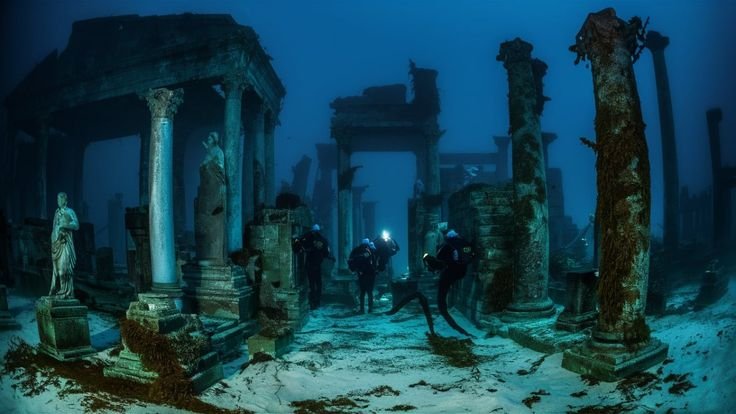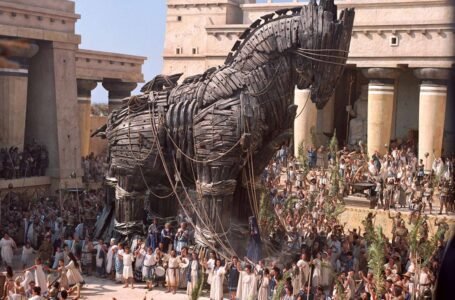Atlantis Unveiled: Between Plato’s Allegory and the Archaeological Quest for a Lost Civilization

Ananya Sinha
Few myths have created as much interest and controversy as the legend of Atlantis. First written down by Greek philosopher Plato in his dialogues Timaeus and Critias, Atlantis was portrayed as an immense and highly developed island civilization that sank into the sea “in a single day and night of disaster.” For more than two thousand years, scholars, explorers, and fantasists have tried to decide if Atlantis was a historical fact, a moral fable, or a combination of the two. The lasting fascination is in its dual nature: as a philosophical story with deep moral considerations and as a fascinating mystery that invites archaeological exploration.
Plato’s Account – The Birth of the Legend
Plato’s story places Atlantis outside the “Pillars of Heracles” (usually taken to be the Strait of Gibraltar), prospering about 9,000 years earlier than his own time. In the Critias, Atlantis is described as a great sea power, greater than Libya and Asia put together, with great engineering, a great navy, and a high level of culture. Its capital city had concentric rings of water and land, magnificent temples, and technological advancement.
But the Atlanteans came to be overcome by greed, hubris, and corruption. As punishment, the gods sank the island in a worldwide flood and earthquake. Plato presents the myth in Timaeus as a narrative of old transmitted by Egyptian priests to Athenian statesman Solon and set forth as a verified history in foreign archives.
From its initial telling, Atlantis was therefore both a historical assertion and a moral tale—an instance of hubris followed by divine punishment.
Allegorical Interpretations
Most scholars contend that Plato’s Atlantis was never meant to be taken literally. The narrative has all the earmarks of an allegory meant to function for philosophical purposes:
Political Philosophy: Plato explains his ideal state in The Republic. Atlantis could stand as the opposite—an aggressive, expansionist empire deformed by materialism, contrasted with the virtuous, self-controlled Athens.
Myth as Moral Illustration: By situating the destruction of Atlantis in remote antiquity, Plato makes the lesson universal, implying that even highly developed societies are at risk for moral decay.
Didactic Function: Plato often employed mythological accounts (mythos) in combination with rational argumentation (logos) to impart truths transcending empirical evidence.
According to this interpretation, Atlantis was a fictional model of a failed society, designed to shed light on Plato’s political thought and moral admonitions.
Historical Hypotheses – Was There a Real Atlantis?
Even after the allegorical interpretation, the possibility of a historical foundation for Atlantis has led to a vast array of hypotheses:
1. Minoan Civilization and the Thera Eruption
One of the most popular theories places Atlantis on the Minoan civilization of Crete and on the volcanic island of Thera (modern-day Santorini). The explosion of Thera around 1600 BCE ruined the Aegean, creating tsunamis and clouds of ash that could have paralyzed Minoan power. The Minoans were a sea-borne culture of incredible sophistication—comparable to Plato’s account of advanced engineering, palatial style, and naval supremacy.
But the chronology is incompatible with Plato’s 9,000 years prior to Solon (c. 9600 BCE). Proponents of the theory propose either that the figures of Plato were symbolic or that Plato’s Egyptian original was misinterpreted.
2. Bronze Age Civilizations of the Western Mediterranean
A few scholars locate Atlantis in the western Mediterranean, identified with Tartessos—a prosperous civilization in southern Spain familiar to the Phoenicians. Tartessos was active sometime during the first millennium BCE and matches details of Plato’s location hints (beyond the Pillars of Heracles), although its demise is not documented.
3. Lost Cultures of the Atlantic and Caribbean
More speculative explanations suggest Atlantis as a prehistoric culture of the Atlantic, perhaps with connections to early maritime cultures. Defenders occasionally point to geological structures such as the submerged Azores Plateau or Bimini Road as proof, but these remain extremely contentious within science.
Archaeological Evidence and Challenges
No archaeologic evidence has yet proven the existence of Atlantis as Plato defined it. Many features complicate the search:
Submerged Sites: Coastal towns of the final Ice Age may now lie underwater through post-glacial sea-level increase and hence be hard to find.
Oral Transmission: Centuries of word-of-mouth narration would have likely changed details beyond recognition if Atlantis had been modeled on an actual event.
Geological Events as Inspiration: Eruptions like that at Thera, earthquakes in the Mediterranean, and flooding of the Black Sea could have inspired composite memories of a “lost city.”
However, underwater archaeology revealed stunning submerged ruins across the globe—like Pavlopetri in Greece and Dwarka in India—showing that ancient urban civilizations were capable of being lost to the ocean.
Geological and Environmental Cues
Plato’s description of the demise of Atlantis during a day and night inspires catastrophic geological events. Contemporary geology chronicles a few candidates:
Thera Eruption: This is one of the largest recorded volcanic eruptions, which ruined surrounding civilizations.
Helike Earthquake (373 BCE): The Greek city of Helike sank overnight into the Corinthian Gulf, a recent occurrence in Plato’s lifetime that might have contributed to his imagery.
Post-Ice Age Flooding (c. 10,000 BCE): Melting ice caused worldwide sea levels to rise, flooding the coasts and perhaps inspiring early flood myths, such as the story of Atlantis.
Atlantis in Comparative Mythology
The Atlantis legend has struck a chord in myths of world-wide floods—Mesopotamia’s Epic of Gilgamesh, the Biblical story of Noah, and India’s story of Manu. All these parallels imply that humans shared a collective memory of massive floods in ancient times.
Far from being a specific city, Atlantis can be an archetype for a culture—a sign of lost golden ages and civilizations destroyed by nature’s wrath or human stupidity.
Modern Explorations and Popular Culture
The 19th and 20th centuries witnessed a burst of Atlantis speculation. Ignatius Donnelly’s 1882 book Atlantis: The Antediluvian World made popular the concept that Atlantis was the nursery of all the ancient civilizations, with a spread into Egypt, Mesopotamia, and the Americas. While discredited by orthodox archaeology, Donnelly’s perception spurred the public’s interest.
In popular culture—from Jules Verne to contemporary film—Atlantis has become shorthand for a lost advanced world. Although such romanticized Atlantis usually has little relation to Plato’s original, it indicates the continued psychological strength of the myth.
The Middle Path – Myth with a Kernel of Truth
A majority of modern scholars take a middle-ground approach:
Historical Core: Atlantis was perhaps based on one or more actual civilizations that came to a sudden end, like the Minoans.
Philosophical Expansion: Plato adapted and elaborated on the story to use as an ethical and political allegory.
Symbolic Geography: The exact location is perhaps secondary to the role of the tale as a warning about moral collapse.
Why Atlantis Endures
Atlantis remains in the popular imagination for a number of reasons:
Universal Themes: The rise and decline of civilizations is a cyclical pattern of history, making Atlantis eternally relevant.
Hope of Discovery: The hope that future archaeological discovery might uncover an actual Atlantis sustains the enigma.
Mythic Resonance: As with all long-lasting myths, Atlantis resonates with human aspirations for creation myths, lost wisdom, and cautions about hubris.
Conclusion – Atlantis Between History and Myth
Whether Atlantis existed as a real island society engulfed by the sea or an exemplary allegory by Plato, its influence cannot be denied. Archaeological findings indicate that the ancient world experienced cataclysmic occurrences powerful enough to create such a myth, but no concrete evidence to date has been found.
Atlantis exists in suspense between two worlds—anchored in the philosophical heritage of pre-Christian Greece and sustained by the romantic fascination with forgotten cultures. Ultimately, its most precious treasure could be not a lost city waiting to be rediscovered, but the lasting lesson that it teaches: that however sophisticated or prosperous a society grows, it is never free from the outcomes of its ethical decisions and its attitude toward nature.
And so, Atlantis remains both a reflection of man’s vaunted aspirations and a caution from the bottom—reminding us that the division between myth and history is as insubstantial as the ocean that can be assumed to have swallowed it.


